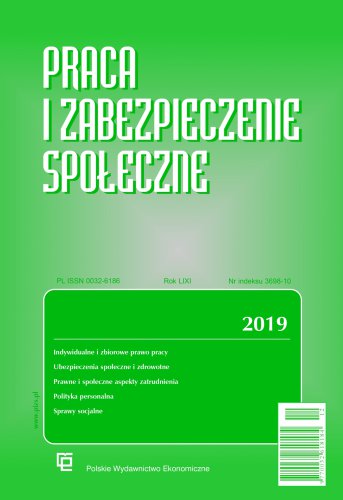Niewyśniony sen o europejskich radach zakładowych. Jak związki przegrywają z korporacjami ponadnarodowymi
Artykuł zawiera próbę odpowiedzi na pytanie, czy związki zawodowe potrafią wykorzystać instytucję europejskich rad zakładowych do wzmocnienia pozycji reprezentacji pracowniczej vis-à-vis korporacji ponadnarodowych. W ocenie autora problemy z budowaniem transgranicznej solidarności związków zawodowych i ich niezdolność do wypracowania wspólnej pozycji wobec zjawiska ponadnarodowych układów ramowych (TCA) sprawiają, że związkowe podejście do roli europejskich rad zakładowych staje się coraz bardziej ambiwalentne. W rezultacie głównymi beneficjentami istnienia rad mogą, paradoksalnie, stać się zarządy korporacji ponadnarodowych.
Bibliografia
Adamczyk, S., Surdykowska, B. (2012). The importance of transnational company agreements from the perspective of industrial relations in the new member states: the Polish case. W: S. Leonardi (red.), Transnational Company Agreements. A stepping stone towards a real internationalisation of industrial relations? (151-162). Rome: Edesse.
Adamczyk, S., Surdykowska, B. (2014). Niewykorzystany potencjał europejskiego dialogu społecznego. Roczniki Administracji i Prawa Wyższej Szkoły Humanitas w Sosnowcu, I, 236-275.
Adamczyk, S., Surdykowska, B. (2015). Europejskie układy ramowe – niedoceniana przez związki zawodowe szansa na wymknięcie się z pułapki globalizacji. Monitor Prawa Pracy, (11), 577-581.
Adedayo Ijalaye, D. (1978). The Extension of Corporate Personality in International Law. Oceana.
Arthurs, H. (2014). Making Bricks Without Straw: The Creation of a Transnational Labour Regime. Articles & Book Chapters,1605, http://digitalcommons.osgoode.yorku.ca/scholarly_works/1605,
Artus, I. (2006). Strike action to save the life of a plant is followed by its “honourable death”: The conflict at AEG in Nuremberg. Transfer, 12(4), 563-575, https://doi.org/10.1177/102425890601200407
Cassese, A. (1986). International Law in the Divided World. Clarendon.
Cata Backer, L. (2011). On the Evolutions of the United Nations’ „Protect-Respect-Governance Remedy”. Santa Clara Journal of International Law, (9), 101-156.
Compa, L. (2014).When in Rome: the exercise of power by foreign multinational companies in the United States. Transfer, 20(2), 271-293, https://doi.org/10.1177/1024258914526105
Crawford, J. (2012). Brownilie’s Principles of Public International Law. Oxford, https://doi.org/10.1093/he/9780199699698.001.0001
de Brabandere, E. (2010). Human Rights and Transnational Corporations: The Limits of Direct Corporate Responsibility. Human Rights and International Legal Discourse, 4(1), 66-88.
de Spiegelaere, S., Jagodziński, R. (2016). European Works Councils and SE works councils in 2015. Facts&Figures. Brussels: ETUI.
Durham, W. L. (1984). The Proposed Vredeling Directive: A Modest Proposal of the Exportation of Industrial Democracy. Virginia Law Review, 70(7), 1469-1503, https://doi.org/10.2307/1073051
ETUC. (2012). Resolution on 6-7 March 2012: „Collective bargaining: The ETUC priorities and working programme”. ETUC.
ETUI. (2019). Benchmarking Working Europe 2019, Brussels: ETUI.
Fetzer, T. (2008). European Works Councils as Risk Communities: The Case of General Motors. European Journal of Industrial Relations, 14(3), 289-308, https://doi.org/10.1177/0959680108094136
Gill, S. (1998). New constitutionalism, democratisation and global political economy. Pacifica Review: Peace, Security & Global Change, 10(1), 23-38, https://doi.org/10.1080/14781159808412845
Gładoch, M. (2014). Dialog społeczny w zbiorowym prawie pracy. Toruń: TNOiK.
Gould, W. B. (1976). Multinational Corporations and Multinational Unions: Myths, Reality and the Law. The International Lawyer, 10(4), 655-667.
Hann, D. (2010). The continuing tensions between European Works Councils and trade unions – a comparative study of the financial sector. Transfer, 16(4), 525-540, https://doi.org/10.1177/1024258910382968
Huzzard, T., Docherty, P. (2005). Between global and local: eight European Works Councils in retrospect and prospect. Economic and Industrial Democracy, 26(4), 541-568, https://doi.org/10.1177/0143831X05057452
Jagodziński, R. (2011). EWCs after 15 years – success or failure? Transfer, 17(2), 203-216, https://doi.org/10.1177/1024258911401532
Koutroukis, T. (2015). The added value of European Works Councils: A case study approach in Greek subsidiaries. MPRA Paper, 62741.
Lecher, W. i in. (2001). European Works Councils: Developments, Types and Networking. Aldeshot: Gover.
Levinson, C. (1972). International Trade Unionism. London: Routledge.
Mählmeyer, W., Rampeltshammer, L., Hertwig, M. (2017). European Works Councils during the financial and economic crisis: Activation, stagnation or disintegration? European Journal of Industrial Relations, 23(3), 225-242, https://doi.org/10.1177/0959680116685951
Mueller, F. (1996). National stakeholders in the global contest for corporate investment. European Journal of Industrial Relations, 2(3), 345–368, https://doi.org/10.1177/095968019623004
Mueller, F., Purcell, J. (1992). The Europeanization of manufacturing and the decentralization of bargaining: multinational management strategies in the European automobile industry. International Journal of Human Resource Management, 3(1), 15–34, https://doi.org/10.1080/09585199200000128
Müller, T., Platzer, H. -W. (2003). European Works Councils: a new Mode of EU Regulation and the Emergence of a European multi-level Structure of Workplace Industrial Relations. W: B. Keller, H. -W. Platzer (red.): Industrial Relations and European Integration - Trans- and Supranational Developments and Prospects. London: Routledge, 58-84, https://doi.org/10.4324/9781315198903-4
Müller, T., Platzer, H.-W. i Rüb, S. (2010). Transnational company policy and coordination of collective bargaining: New challenges and roles for European industry federations. Transfer, 16(4), 509-524, https://doi.org/10.1177/1024258910383083
OECD. (2018). Multinational enterprises in the global economy Heavily debated but hardly measured, available at: https://www.oecd.org/industry/ind/MNEs-in-the-global-economy-policy-note.pdf
Pugliano, W., Waddington, J. (2019). Management, European Works Councils and institutional malleability. European Journal of Industrial Relations, https://doi.org/10.1177/0959680118824512
Schulten, T. (1996). European works councils: prospects for a new system of industrial relations. European Journal of Industrial Relations, 2(3), 303-324, https://doi.org/10.1177/095968019623002
Skupień, D. (2008). Europejskie rady zakładowe. Toruń: TNOiK.
Streeck, W. (1997). Neither European nor works councils: a reply to Paul Knutsen. Economic and Industrial Democracy, 18(2), 325-337, https://doi.org/10.1177/0143831X97182007
Telljohann, V., da Costa, I., Müller, T., Rehfeldt, U., Zimmer, R. (2009). European and international framework agreements: new tools of transnational industrial relations. Transfer, 15(3-4): 505- 525, https://doi.org/10.1177/10242589090150031701
Timming, A. R. (2007). European Works Councils and the dark side of managing worker voice. Human Resource Management Journal, 17(3), 248–264, https://doi.org/10.1111/j.1748-8583.2007.00043.x
UNCTAD. (1993). World Investment Report. New York-Geneva.
UNCTAD. (2010). World Investment Report. New York-Geneva.
Waddington, J. (2011). European works councils. A transnational industrial relations institution in the making. New York/Abington: Routledge, https://doi.org/10.4324/9780203843536
Waddington, J., Kerckhofs, P. (2003). European Works Councils: what is the current state of play. Transfer, 9(2), 303-325, https://doi.org/10.1177/09596801030093004
Whittall, M. (2000). The BMW European Works Council: a cause for European industrial relations optimism? European Journal of Industrial Relations, 6(1), 61-83, https://doi.org/10.1177/095968010061004
Wratny, J. (2019). Fenomen partycypacji pracowniczej w nurcie przemian stosunków pracy. Warszawa: C.H. Beck.
Zambrana Téva, N. (2012). Shortcomings and Disadvantages of Existing Legal Mechanism to Hold Multinational Accountable for Human Rights Violations. Cuadernos de Derecho Transnational, 4(2), 397-410.

